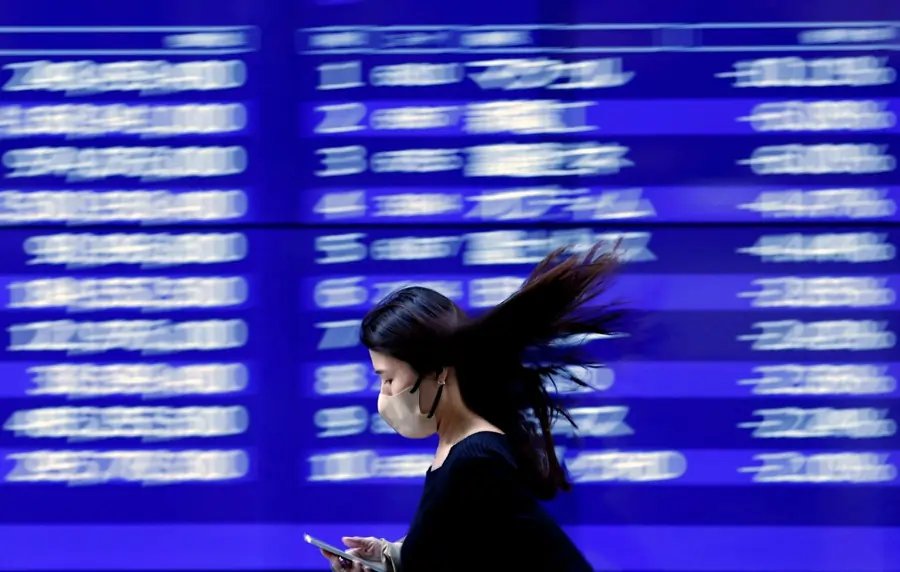Wall Street stocks advance, dollar steady amid political turmoil in South Korea, France
Published by Jessica Weisman-Pitts
Posted on December 4, 2024
5 min readLast updated: January 28, 2026

Published by Jessica Weisman-Pitts
Posted on December 4, 2024
5 min readLast updated: January 28, 2026

By Lawrence Delevingne and Tom Wilson
BOSTON/LONDON (Reuters) -Global shares were mixed and the euro was steady on Wednesday as markets digested political turmoil in South Korea, where martial law was imposed then lifted hours later, and in France, where a no-confidence vote looked set to topple the government.
Wall Street’s major stock indices gained, with traders appearing more focused on the potential for lower domestic interest rates and strong third-quarter results from the likes of enterprise cloud company Salesforce and drugmaker Eli Lilly.
UnitedHealth shares gained 0.4% even as Brian Thompson, the CEO of its insurance unit, was fatally shot on Wednesday morning in New York City, several media outlets reported, citing police officials.
The S&P 500 gained 0.38% to 6,072 and the Nasdaq Composite jumped around 1% to 19,670 — both record highs — while the Dow Jones Industrial Average rose 0.37% to 44,871.
U.S. Treasury yields also rose after St. Louis Federal Reserve President Alberto Musalem said he expects the Fed will be able to continue to cut interest rates, but warned that the pace of future actions has grown less clear.
In South Korea, Asia’s fourth-largest economy, lawmakers called on President Yoon Suk Yeol to resign or face impeachment after he declared martial law late on Tuesday, only to reverse the move hours later.
The crisis left South Korea’s benchmark KOSPI index down 1.4%, taking its year-to-date losses to over 7% and making it the worst performing major stock market in Asia this year.
MSCI’s broadest index of Asia-Pacific shares outside Japan, which counts Samsung Electronics as one of its top constituents, fell 0.15%. Most Asian markets aside from South Korea rose.
The won currency, buoyed by suspected central bank intervention, steadied but remained close to the two-year low against the dollar that it hit late on Tuesday.
South Korea’s finance ministry said it was prepared to deploy unlimited liquidity into financial markets. Reports said the financial regulator was ready to deploy 10 trillion won ($7.1 billion) in a stock market stabilisation fund.
“Martial law itself has been lifted, but this incident creates more uncertainty in the political landscape and the economy,” said ING senior economist Min Joo Kang.
Meanwhile, in Europe, stocks gained about 0.45% and the euro traded near a two-year low ahead of the no-confidence vote in France.
French lawmakers are all but certain to oust the fragile coalition of Prime Minister Michel Barnier, deepening the political crisis in the euro zone’s second-largest economy.
The debate started at 1500 GMT in parliament, and the outcome is likely to be clear by 1900 GMT. Barring a late surprise, Barnier’s government will be France’s first to be forced out by a no-confidence vote in more than 60 years, at a time when the country is struggling to tame a massive budget deficit.
The single currency, last at $1.0530, has fallen 5% over the last three months, when investors began bracing for tariff-heavy policies from the incoming administration of President-elect Donald Trump.
“The general sense is that this vote could be successful,” Deutsche Bank analysts wrote. “If so, there isn’t an obvious route forward on what happens next.”
French 10-year government bonds were steady.
US POLICY PATH
Away from political turmoil, investors are hoping for more clues on the policy path the Fed will likely take next year, with a much-anticipated November employment report due on Friday.
U.S. job openings increased solidly in October while layoffs dropped by the most in 1-1/2 years, data showed on Tuesday, suggesting the labour market is slowing, even as another survey showed employers were hesitant to hire more workers.
Markets are now ascribing an about 73% chance of a 25 basis point cut this month, with 80 bps of cuts expected by the end of next year.
The yield on benchmark U.S. 10-year notes rose 0.3 basis point to 4.225%, from 4.221% late on Tuesday.
The spotlight now turns to Fed Chair Jerome Powell, who will give on Wednesday what are expected to be his last public remarks ahead of the Dec. 17-18 meeting. In currencies, the dollar index, which measures the U.S. currency against six rivals, was little changed at 106.21.
“Our baseline view is that the USD will strengthen in 2025 but face an air pocket of weakness early in the year on continued Fed rate cuts and uncertainty over policy implementation,” Standard Chartered currency strategists wrote in a note on Tuesday.
Oil prices firmed as market participants weighed up geopolitical tensions and the prospect of OPEC+ extending supply cuts against weaker demand.
U.S. crude fell 0.41% to $69.65 a barrel and Brent fell to $73.36 per barrel, down 0.34% on the day. [O/R]
(Reporting by Lawrence Delevingne in Boston, Tom Wilson in London and Ankur Banerjee in Singapore; Editing by Nicholas Yong, Alexander Smith, Christina Fincher and Jonathan Oatis)
Monetary policy refers to the actions taken by a country's central bank to control the money supply and interest rates to achieve macroeconomic objectives like controlling inflation and stabilizing currency.
A stock market is a public marketplace where shares of publicly traded companies are bought and sold, allowing investors to trade ownership in businesses.
Foreign exchange, or forex, is the global marketplace for trading national currencies against one another, influencing exchange rates and international trade.
Economic growth is the increase in the production of goods and services in an economy over a period, typically measured by the rise in Gross Domestic Product (GDP).
Explore more articles in the Investing category











